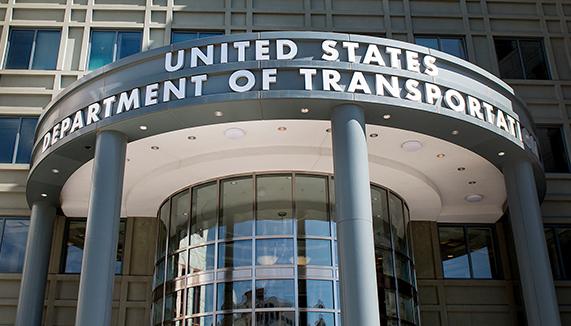Source: US DOT
- January is National Human Trafficking Prevention Month
The U.S. Department of Transportation is marking National Human Trafficking Prevention Month by taking several actions to raise awareness about human trafficking and how to recognize and prevent this terrible crime. Combating human trafficking in the transportation sector is a top priority for the Department.
“Every year, human traffickers seek to use America’s transportation systems to facilitate unspeakable crimes,” said U.S. Transportation Secretary Pete Buttigieg. “National Human Trafficking Prevention Month is an opportunity for us to redouble our anti-trafficking efforts by making sure travelers know how to recognize and report the warning signs and by embracing innovative approaches and strategies like the ones we’re recognizing today.”
According to the International Labour Organization, globally, as many as 27.6 million people – or 3.5 out of every 1,000 people – are victims of forced labor, including commercial sexual exploitation. In 2021, the National Human Trafficking Hotline (NHTH) worked on 10,360 cases of human trafficking in the United States.
Today, Secretary Buttigieg announced the winner and runners up of the Department’s 2022 Combating Human Trafficking in Transportation Impact Award, which incentivizes innovative solutions to combat human trafficking in the transportation industry. The Port of Seattle won first-place for its “Airports United Against Human Trafficking” proposal to convene a national steering committee of up to 20 diverse airports and scale the Port’s comprehensive counter-trafficking approach into an awareness toolkit for use by airports nationwide.
Trinity Metro earned second place for its “Stop Human Trafficking Campaign” proposal to implement counter-trafficking training for Dallas-Fort Worth area transit workers and first responders, raise awareness among the traveling public, and train more than 40 local governments in the region. The Colorado Human Trafficking Council received third place for its “This is Human Trafficking” campaign proposal to conduct a state-wide campaign to raise awareness through gas stations and convenience stores along the main arteries of I-70 and I-25.
Signs of suspected human trafficking may include individuals that appear not to have freedom of movement or social interaction, appear not to have control of their travel identification or documents, are controlled or unusually submissive to their traveling companion, seem coached when speaking to authority or law enforcement, have no logical means of reaching their final destination, are traveling on a last-minute booking paid by someone else in cash, or may be dropped off by a vehicle at a truck and picked up 15-20 minutes later. The DOT Advisory Committee on Human Trafficking’s Combating Human Trafficking in the Transportation Sector report includes additional multimodal indicators.
The Department’s Transportation Leaders Against Human Trafficking (TLAHT) initiative comprises over 550 transportation and travel industry stakeholders working jointly to maximize their collective impact in combating human trafficking across all modes of transportation. Stakeholders can join the effort by signing the TLAHT pledge, and accessing transportation-specific counter-trafficking resources online. TLAHT pledge signatories include airports and airlines, urban and rural transit agencies, trucking and bus companies, ports, railways, state departments of transportation, industry associations, states, cities, and non-governmental organizations.
Additional actions that the Department is taking this month to combat human trafficking include:
- The Federal Register Notice for the 2023 Combating Human Trafficking in Transportation Impact Award is currently open for submissions.
- Administrators Shailen Bhatt of the Federal Highway Administration, Nuria Fernandez of the Federal Transit Administration, and Robin Hutcheson of the Federal Motor Carrier Safety Administration launched leadership videos on social media this month to encourage highway, transit, and motor carrier stakeholders to bolster their counter-trafficking efforts.
- The Federal Transit Administration hosted a virtual event that explored how human trafficking impacts American Indian/Alaskan Native populations, the role of transportation and public transit in counter-trafficking, and how transit agencies, drivers, and other front-line transit employees can help to prevent human trafficking.
- The Department’s counter-trafficking initiative is also reaching hundreds of transportation stakeholders this month to help them step-up efforts to combat human trafficking through in-person events with the U.S. Chamber of Commerce and Department of Homeland Security.
Some of the other ways in which the Department is working annually to combat human trafficking include:
- The Department rechartered the Advisory Committee on Human Trafficking (ACHT) using its authorities under the Bipartisan Infrastructure Law (BIL). The ACHT will develop a counter-trafficking report with recommendations for countering human trafficking, an assessment of best practices by transportation stakeholders, and human trafficking violations involving commercial motor vehicles. The 15 members will include a cross-section of stakeholders from both industry and labor, including representatives from the aviation, bus, law enforcement, maritime, port, rail, and trucking sectors.
- The Department is a member of the President’s Interagency Task Force to Monitor and Combat Trafficking in Persons (PITF), a Cabinet-level entity chaired by the Secretary of State to coordinate Federal efforts to combat trafficking in persons.
- The Department continues to underscore the important role transportation ministries have in combating human trafficking through its participation in multilateral organizations, including the International Transport Forum (ITF), the International Civil Aviation Organization (ICAO), and the Asia Pacific Economic Cooperation Transportation Working Group (APEC). More than 50 ITF and APEC transportation ministers have committed to tackling the issue of human trafficking. DOT led the development of comprehensive counter-trafficking strategies for ICAO’s 193 member States and APEC’s 21 member economies.
For more information about the Department’s efforts to end human trafficking, click here.

